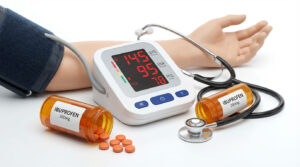What is High Cholesterol?
Cholesterol is a waxy, fat-like substance produced by the liver and found in many foods. It is an essential building block of cell membranes and is necessary for producing hormones and vitamin D. However, when cholesterol levels become too high; it can lead to various health problems.
High cholesterol, also known as hypercholesterolemia or hyperlipidemia, is a condition in which there is an excessive amount of cholesterol in the blood. It can happen for different reasons, including genetics, diet, and lifestyle factors such as lack of exercise and smoking.
When cholesterol levels are too high, it can form plaques in the arteries, which can narrow the blood vessels and increase the risk of heart disease and stroke. High cholesterol is one of the leading causes of heart disease, responsible for more deaths each year than any other condition.
What are the Different Causes of High Cholesterol in Individuals?
Here are some possible high cholesterol (hyperlipidemia) causes in individuals:
- Your diet: Eating foods that are high in saturated and trans fats, such as red meat, full-fat dairy products, and processed snacks, can raise your LDL (bad cholesterol) levels
- Your weight: Being overweight or obese can increase your LDL cholesterol and lower your HDL (or good cholesterol), putting you at risk for high cholesterol and related health issues
- Your physical activity: A lack of regular exercise can lead to higher levels of LDL cholesterol and lower levels of HDL cholesterol, as well as contribute to weight gain
- Your age and gender: As you age, your cholesterol levels tend to increase, especially after menopause in women. Men also tend to have higher levels of LDL cholesterol than women.
- Your genetics: Familial hypercholesterolemia and other inherited conditions can cause high cholesterol symptoms even in individuals who follow a healthy lifestyle
- Your medical conditions: Certain medical conditions such as diabetes, hypothyroidism, kidney disease, and liver disease can contribute to high cholesterol levels
- Your medication use: Some medications, such as birth control pills, steroids, and some types of blood pressure medication, can affect your cholesterol levels
- Your smoking and alcohol consumption: Smoking can lower your HDL cholesterol levels, while heavy alcohol consumption can raise your triglyceride levels and contribute to weight gain, both of which can affect your cholesterol levels.
Remember, hyperlipidemia is a risk factor for heart disease, so managing your cholesterol levels through healthy lifestyle choices and, if needed, medication is essential.
Symptoms of High Cholesterol
There are different signs of high cholesterol on the face you may experience, including:
- Yellowish patches around the eyes (xanthelasma), yellowish discoloration on the skin (xanthoma), and small red or white bumps on the skin (milium).
- If high cholesterol leads to plaque buildup in your arteries, you may experience symptoms of cardiovascular disease, such as chest pain, shortness of breath, and numbness or weakness in your arms or legs.
- If a plaque ruptures and causes a blood clot to form, you may experience symptoms of a heart attack, such as chest pain, sweating, nausea, and shortness of breath.
- If a blood clot travels to your brain and blocks a blood vessel, you may experience stroke symptoms, such as weakness or paralysis on one side of your body, slurred speech, and vision changes.
Are there any Risk factors for High Cholesterol?
Yes, there are several risk factors for hyperlipidemia, including:
- Unhealthy diet: Eating foods that are high in saturated and trans fats, such as red meat, full-fat dairy products, and processed snacks, can raise your LDL (bad) cholesterol levels
- Lack of physical activity: A sedentary lifestyle can lead to higher levels of LDL cholesterol and lower levels of HDL (good) cholesterol, as well as contribute to weight gain
- Obesity or overweight: Being overweight or obese can increase your LDL cholesterol and lower your HDL cholesterol, putting you at risk for high cholesterol and related health issues
- Age and gender: As you age, your cholesterol levels tend to increase, especially after menopause in women. Men also tend to have higher levels of LDL cholesterol than women.
- Genetics: Familial hypercholesterolemia and other inherited conditions can cause high cholesterol even in individuals who follow a healthy lifestyle
- Medical conditions: Certain medical conditions such as diabetes, hypothyroidism, chronic kidney disease, and liver disease can contribute to high cholesterol levels
- Medication use: Some medications, such as birth control pills, steroids, and some types of blood pressure medication, can affect your cholesterol levels
- Smoking and alcohol consumption: Smoking can lower your HDL cholesterol levels. Heavy alcohol consumption can raise triglyceride levels and contribute to weight gain, affecting cholesterol levels.
Diagnosis of High Cholesterol
High cholesterol or hyperlipidemia can be diagnosed through a blood test called a lipid profile test or lipid panel test. This test measures several types of fats, including total cholesterol, LDL cholesterol (often referred to as “bad” cholesterol), HDL cholesterol (often referred to as “good” cholesterol), and triglycerides.
The test is usually done after fasting, typically 9 to 12 hours, to get accurate readings of the cholesterol levels. The results will show the levels of each type of cholesterol in your blood, and your doctor will use these results to determine if your cholesterol levels are normal, high, or very high.
The National Cholesterol Education Program recommends that all adults have their cholesterol levels checked every 4 to 6 years, starting at age 20. However, if you have risk factors for heart disease, such as obesity, high blood pressure, diabetes, or a family history of heart disease, your doctor may recommend more frequent testing.
Read More: Lipid Panel: What It Is, Purpose, Preparation and Results
Treatment of High Cholesterol
High cholesterol symptoms can be treated in several ways, including lifestyle changes and medication. Here are some common approaches you can undertake for high cholesterol treatment:
- Lifestyle changes: These include eating a heart-healthy diet, engaging in regular exercise, losing weight if necessary, quitting smoking, and limiting alcohol consumption
- Medications: Statins are the most commonly prescribed medication for high cholesterol. They work by blocking an enzyme in the liver that produces cholesterol. Other medications, such as bile acid sequestrants, nicotinic acid, and fibric acid derivatives, may also be used in some instances
- Combination therapy: Sometimes, lifestyle changes and medication combinations may be needed to achieve optimal cholesterol levels.
How to Prevent High Cholesterol?
Hyperlipidemia can be prevented or managed by making certain lifestyle changes. Here are some steps you can take to avoid high cholesterol symptoms:
- Eat a heart-healthy diet: Include plenty of fruits, vegetables, whole grains, lean protein, and healthy fats.
- Be Picky about food items: The best food to reduce cholesterol includes processed meats like bacon, high-fat dairy products, baked food items, etc. You must also avoid other high-cholesterol foods like saturated and trans fats, which can increase your LDL (“bad”) cholesterol levels.
- Exercise regularly: Engage in physical activity for at least 30 minutes most days of the week. It can help lower your LDL cholesterol levels and raise your HDL (“good”) cholesterol levels.
- Maintaining a healthy weight: Losing weight can help lower your LDL cholesterol levels if you are overweight.
- Don’t smoke: Smoking can damage your blood vessels and increase your risk of heart disease.
- Limit alcohol consumption: Excessive alcohol consumption can raise your blood pressure and triglyceride levels, contributing to high cholesterol.
- Get regular check-ups: Have your cholesterol levels checked regularly, especially if you have a family history of high cholesterol or other risk factors for heart disease.
What Medical Problems Affect My Cholesterol levels?
Several medical problems can affect your cholesterol levels. Here are some examples:
- Diabetes: High blood sugar levels can damage your blood vessels and increase your risk of developing high cholesterol
- Hypothyroidism: An underactive thyroid gland can affect your metabolism and lead to high cholesterol levels
- Kidney disease: People with kidney disease may have high levels of triglycerides, which can contribute to high cholesterol levels
- Liver disease: Liver disease can affect how your body produces and processes cholesterol, leading to high levels of LDL (“bad”) cholesterol
- Metabolic syndrome: Metabolic Syndrome is a group of risk factors that includes high blood pressure, high blood sugar levels, and high triglyceride levels, all of which can contribute to high cholesterol levels
- Genetics: Certain genetic conditions, such as familial hypercholesterolemia, can cause high cholesterol levels even if you lead a healthy lifestyle.
How can HealthcareOnTime help with High Cholesterol Symptoms?
At HealthcareOnTime, we recognize that scheduling medical appointments and tests can be challenging, so we offer convenient and cost-effective Diagnostic Test services. Our team of experts is available to perform cholesterol tests at a time and location that is convenient for you or help you schedule an appointment at a diagnostic center near you.
Our medical packages are accessible round-the-clock and include affordable emergency tests and scans. We also provide medical packages for cholesterol tests for your entire family. With routine checkups and consultations with our experienced healthcare providers, prioritizing your health has never been easier.
To experience the utmost health benefits, contact us or visit our website for further assistance with our convenient and affordable healthcare solutions.
BOOK TOTAL CHOLESTEROL TESTTagged In: High Cholesterol Symptom, High Cholesterol Treatments, High Cholesterol Causes








